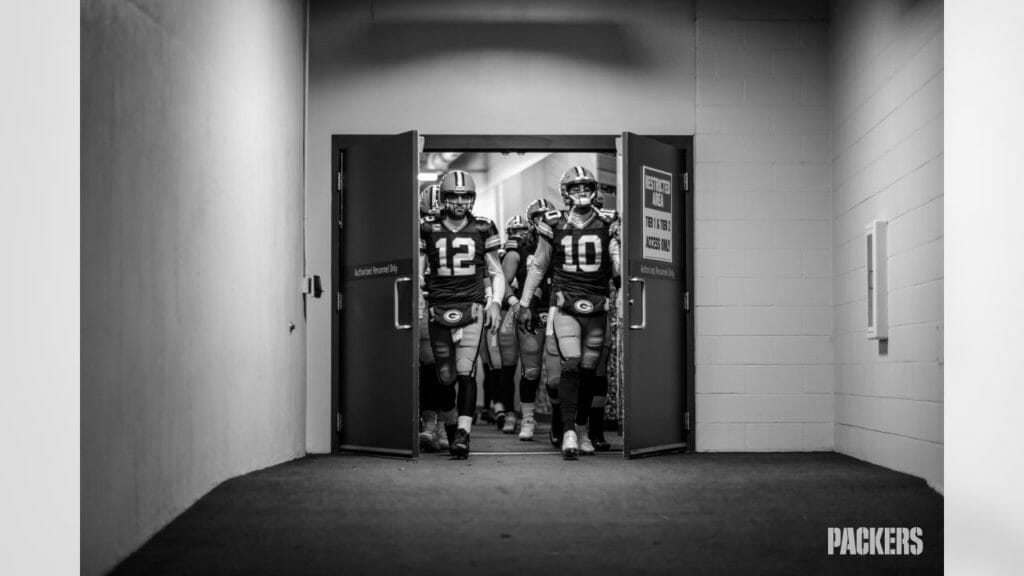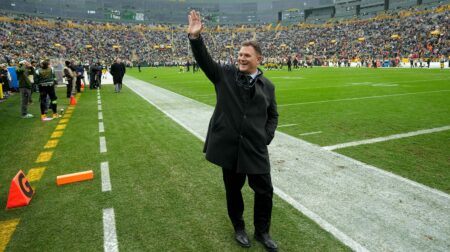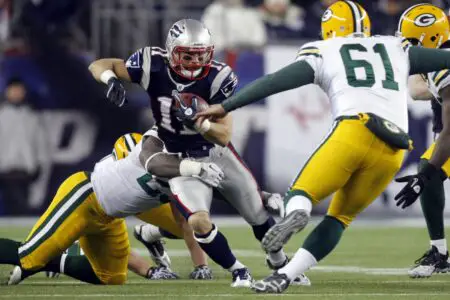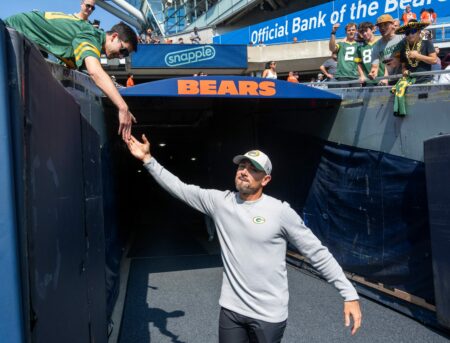As the Green Bay Packers and their fans look forward to a premature offseason, a dark cloud of uncertainty looms. The Packers are on the wrong side of the salary cap by a wide margin. A number of high-priced veterans may face a pay reduction or a release from the roster. Numerous significant contributors – Davante Adams, De’Vondre Campbell, Rasul Douglas, Allen Lazard, MVS, and Robert Tonyan to name a few – are approaching unrestricted free agency.
However, by far the most important questions of the offseason revolve around the quarterback. Will Aaron Rodgers return to the Packers for another run at the Super Bowl? Could he retire? Will the team trade him and start incumbent QB Jordan Love? The debates surrounding this issue have been almost constant since the end of Green Bay’s season.
Although there are always exceptions, the Packers fanbase is seemingly divided into two camps on the issue. On the one hand are those who want to keep Aaron Rodgers for the immediate future, even if that means sacrificing talent at other positions. On the other hand are those who are ready to move on from Rodgers in a trade, receive a boatload of picks and players, and place their hope on Love.
A huge chunk of the cap – about 46 million dollars – is tied up in Rodgers’ contract. To work towards solving their cap woes, the Packers have to do something to adjust this number. They can either trade him or extend him. Either option would help alleviate the cap issues, but they cannot afford to leave his deal as is.
If there is one thing I’ve learned from academic writing, it is that a good author should look at both sides of an issue. That is what I want to do today. I think there are legitimate arguments on both sides, and I want to examine them in as balanced a manner as possible here.
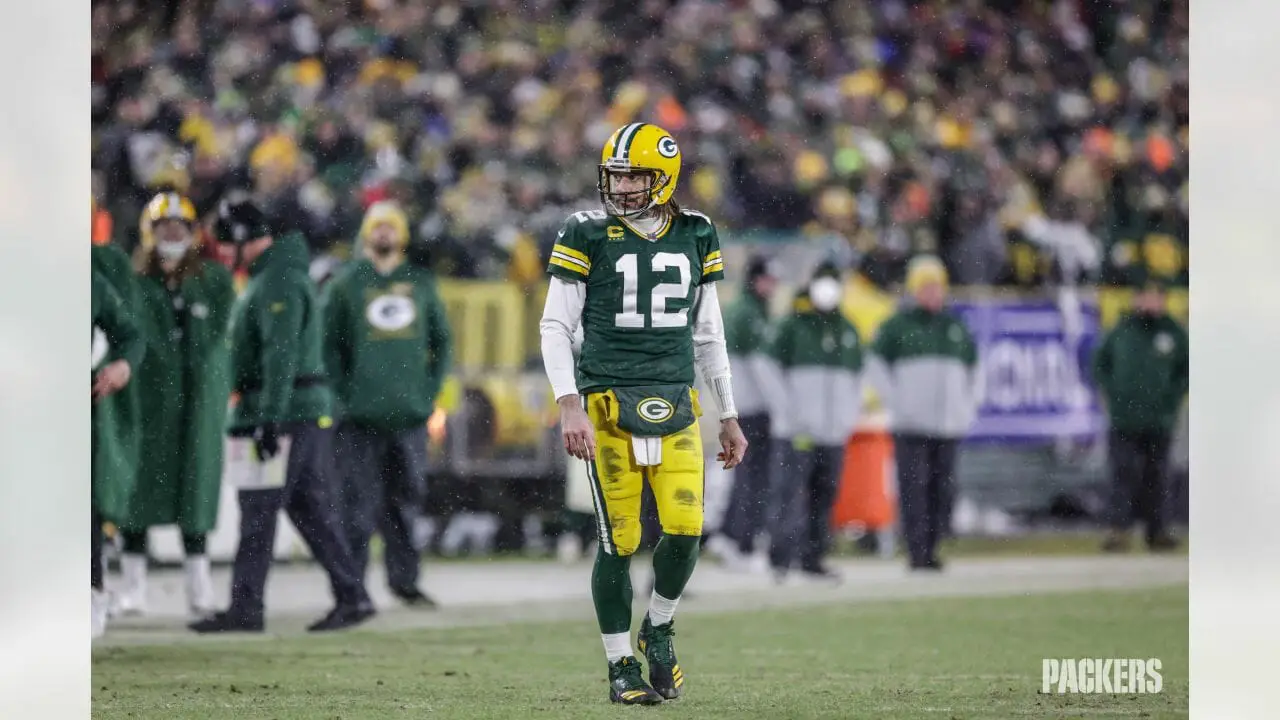
Keeping Rodgers:
Rodgers Provides High-Level Play
From what I’ve gathered, those in support of keeping Rodgers generally base their arguments around a central thesis: good quarterbacks are hard to find, and elite, HOF-level quarterbacks are even harder. Furthermore, good QB play is vital to maintaining realistic Super Bowl hopes. As long as Aaron Rodgers is in Green Bay, the Packers have a good chance to make a deep playoff run.
In general, this line of thinking has a great deal of truth. Good QBs are generally the ones who get to the Super Bowl. A great QB can cover up holes elsewhere on the roster. Otherwise excellent rosters can be – and have been, in the past – sabotaged by bad QB play. Look at where the Rams are now after spending a great deal of resources to upgrade at quarterback. Look at how the Bengals have gotten to the Super Bowl with Joe Burrow, despite some significant holes on their offensive line.
Rodgers Could Help Cover Up the Holes
If Aaron Rodgers is retained, that could persuade Davante Adams to remain in Green Bay as well. Even if the Packers lose talent elsewhere, they can go a long way with arguably the best QB-WR tandem in the NFL. With the retirement of Tom Brady and the future of Russell Wilson uncertain, the level of competition in the NFC could be lower than it has been in a while.
At this point, Jordan Love is an unknown. Turning to him now is a risk. Keeping Rodgers, on the other hand, almost certainly keeps the Packers in contention. It’s easy to see why many want to pursue this course; as a fan, winning is infinitely preferable to losing.
However, I think that there are also legitimate reasons that some fans might be open to the Packers moving on.

Trading Rodgers:
The Trade Compensation
In a scenario where Aaron Rodgers is traded, the return is likely sizable. It could very well include multiple first round picks and a handful of other picks and talented young players. This haul would increase even more if the Packers find a way to tag and trade Davante Adams. With these two players off the cap, a path would be open for Green Bay to resign some key free agents. If they can’t retain everyone, they should be able to patch up any roster holes with newly acquired players or draft picks.
Even with a talented roster, a good QB is still necessary. However, with enough talent around him, Jordan Love wouldn’t have to be elite. A Rodgers trade could bring an impressive influx of resources. With these resources, the Packers could build up Love’s offensive surroundings and bolster the defensive side of the ball.
As those who defend Rodgers’ lackluster record in NFC championship games like to (rightly) point out, even an elite QB needs help from other areas of the team. Trading Rodgers would allow the Packers to build up these other phases. There’s plenty of evidence that a decent-to-good QB can reach and win Super Bowls in the right environment. Early-career Russell Wilson, Nick Foles in 2017, and Jared Goff in 2018 are some examples of this strategy.
Matt LaFleur’s System Could Help
As mentioned previously, there is no way to know how Love would perform as the permanent starter. We still have too little evidence. However, the Shanahan-style system that Matt LaFleur comes from is built to make life easy on the quarterback. Furthermore, LaFleur himself has an excellent track record working with QBs. He was quarterbacks coach in Washington when Robert Griffin III won OROY and went to the Pro Bowl in 2012. RGIII himself publicly praised LaFleur’s QB development skills when LaFleur was hired as Packers HC. As the QB coach with the Falcons in 2016, LaFleur helped Matt Ryan win his sole MVP, as well as First Team All-Pro and Offensive Player of the Year. Hired as Rams OC in 2017, LaFleur coached Jared Goff to his first Pro Bowl and the best TD-to-INT ratio of Goff’s career to date.
The Packers HC clearly has a great deal of experience successfully coaching and developing QBs of many different play styles and experience levels.
Rodgers is Nearing the End of His Career
Rodgers won an MVP award in 2020, appears to be on track to win another in 2021, and shows little sign of slowing down. However, it should also be noted that he is a 38-year-old player who has sustained fairly significant injuries in 3 of his last 5 seasons. It’s entirely possible that Rodgers could re-sign on, say, a two-year deal, tear his ACL in 2022, and retire at the end of the year. Even if Rodgers stays relatively healthy, he is reaching the age where a decline in play becomes more likely. On the surface, keeping Rodgers seems like the safe route, but it may hold risks of its own. Tom Brady’s longevity is likely an exception to the norm. The Packers could end up sacrificing their future and getting little in return.
On the other hand, if the Packers trade Rodgers, they can be more confident facing the future. Even if Love is not good, the Packers can use their trade haul to acquire another quarterback.
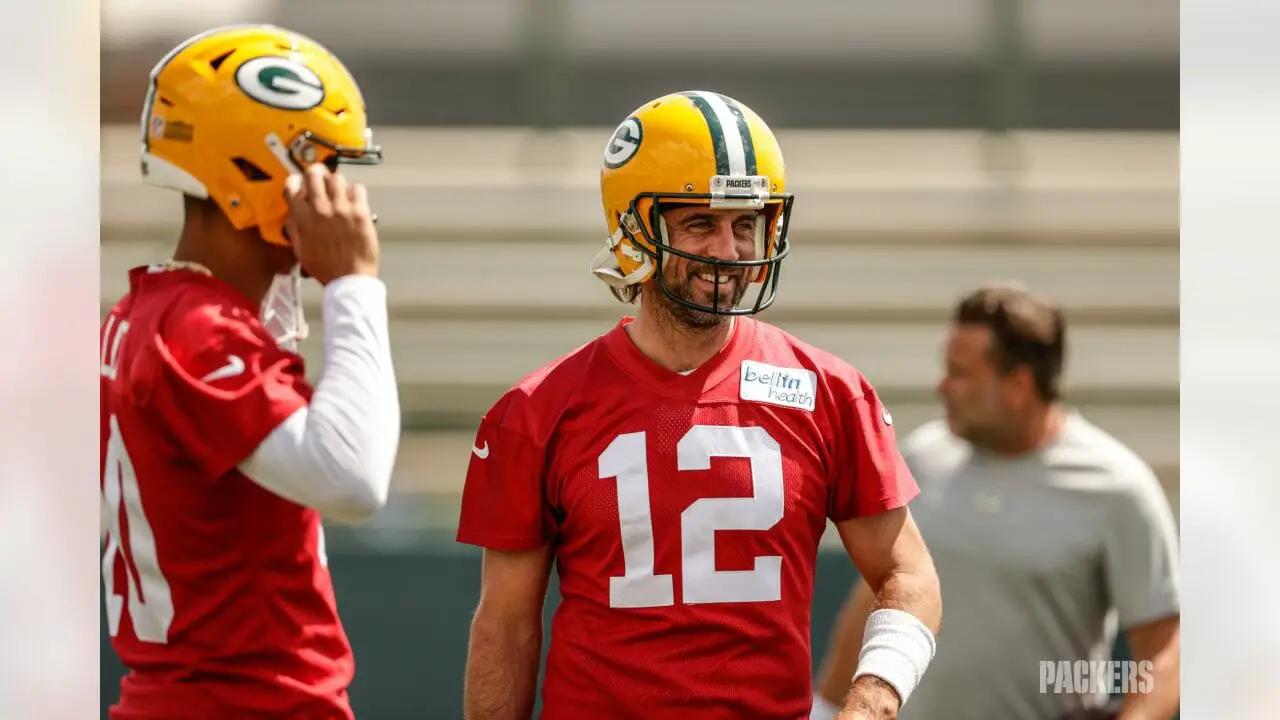
Conclusion
Trading Rodgers would be a gamble. There’s no realistic way to know whether or not Jordan Love can be good enough to reach and win a Super Bowl either next year or in the future. However, keeping Rodgers is a gamble as well. The Packers would be betting that Rodgers could cover up the roster holes that result from his higher cap hit. These holes that could grow even larger if injuries strike or the players that Green Bay will acquire in the 2022 draft fail to contribute on a meaningful basis. As we’ve all seen in the past, it’s tougher for a quarterback to win in the playoffs if other phases – defense, special teams, offensive line, etc. – are lacking.
The Packers have a difficult decision in front of them, and one that could shape the team for years to come.
For More Great Wisconsin Sports Content
Follow me on Twitter at @Sam_DHolman and follow us @WiSportsHeroics for more great content. To read more of our articles and keep up to date on the latest in Wisconsin sports, click here! Also, check out our merch store for some amazing WSH merchandise!

